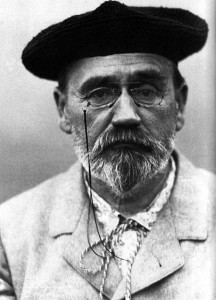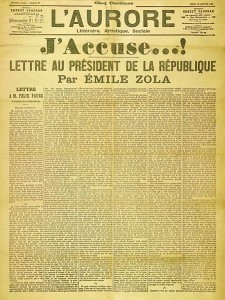Autoportrait d’Émile Zola
by Unknown, used under ![]()
Émile Zola is often credited with being the founder of the Naturalism movement. Zola was born in Paris, France in 1840. Zola published his first novel, La Confession de Claude, in 1865. (Émile-Édouard-Charles-Antoine Zola, 2014) Zola went on to pen many more novels, all of which displayed characteristics of Naturalism.
Zola’s writing was greatly influenced by the many hardships throughout his life. His father died while Zola was very young, leaving his mother to support the family. The family struggled to stay on its feet.
Even though the family was in great debt, Mrs. Zola made a great effort to send Zola to school. At school, Zola was teased for his Parisian accent, lisp, poverty, and nearsightedness.
Despite the hardships, Zola remained optimistic. He and his close friends were fascinated by literature and painting. Zola dreamed of becoming a poet.
Hardship struck the Zola family once again. Zola’s grandmother passed away. Zola, his mother, and grandfather were forced to move away from the countryside to Paris in order to make a better life for themselves. Zola was 18 at the time of the move. By the age of 19, his mother told Zola that it was time for him to make his own living. Zola worked long and hard as a clerk at the docks making very little money. Zola slipped in and out of depression. (The Émile Zola Society, n.d.)
Zola worked different jobs for many years and wrote on the side. Starting in 1862, he published about a novel a year until he published L’Assommoir in 1877. L’Assommoir, a story about alcoholism, finally brought some fame to Zola. He even made a slight profit off of the novel, allowing him to continue writing.
The series “Rougon-Macquart” is Zola’s greatest contribution to French literature and naturalism. “Rougon-Macquart” consists of 20 volumes. These volumes depict life and society under France’s second empire. Zola draws on his hardships and life experiences in his writing. (Classic Reader, n.d.)
In 1896, Zola also got involved with the Dreyfus affair, when he wrote the famous article “J’accuse”. Zola’s article defended a Jewish officer, who he believed had been wrongfully accused. Zola was eventually charged with libel and forced to escape the country in order to avoid imprisonment. (Donald E. Wilkes, 1998)
Front page cover of the newspaper L’Aurore
by Scan of L’Aurore, used under ![]()
Zola’s writings contained many revolutionary characteristics. Zola took to his writing to display his frustrations and hopelessness about problems in the world, in hopes of making a change. Specifically with “J’accuse”, Zola thought that Dreyfus was wrongfully accused, so he brought it to the public’s attention. Zola raised ethical questions about the affair and made other people also question the situation.
A movie was made about Émile Zola’s life, entitled “The Life of Émile Zola”. The film largely focuses on Zola’s role in the Dreyfus affair. Here is the trailer for the movie.
https://www.youtube.com/watch?v=GcSWl5DaL4s
Additional Information:
References:
Classic Reader. (n.d.). About the Author. Retrieved April 13, 2014, from Classic Reader: http://www.classicreader.com/author/203/about/
Donald E. Wilkes, J. (1998, February 11). “J’accuse …!”. Retrieved April 11, 2014, from University of Georgia School of Law: http://www.law.uga.edu/dwilkes_more/his9_jaccuse.html
Émile-Édouard-Charles-Antoine Zola. (2014). The Biography.com website. Retrieved Apr 14, 2014, from http://www.biography.com/people/Émile-zola-37621.
The Émile Zola Society. (n.d.). Biography. Retrieved April 10, 2014, from The Émile Zola Society: http://emilezolasociety.org/biography.html
Unknown. (1902). Autoportrait d’Émile Zola. [Digital image]. Retrieved from http://commons.wikimedia.org/wiki/File%3AZOLA_1902B.jpg. Public domain image.
Scan of L’Aurore. (1898). Front page cover of the newspaper L’Aurore. [Newspaper article]. Retrieved from http://en.wikipedia.org/wiki/File:J_accuse.jpg. Public domain image.


